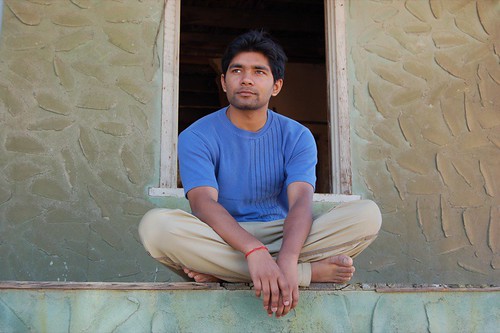The rains have abated and the weather of San Diego has become clement enough to finally allow me to loaf around on my motorcycle in a T-Shirt and a pair of jeans. I seem to be waking up from my hibernation and have started going to the beach again as part of my daily ritual and it was especially beautiful today.
Have you ever closely examined the moment when the sun is about to be engulfed by the immense ocean ? It shines in a deep orange, almost red glow, like a shimmering crystal on a reflecting surface. The red gives way to dark orange and light orange and mild pink mixed with ominous gray till it all dissolves into a monochromatic harbinger of impending night. And the ocean sizzles in a bright silvery dance with the waves breaking on the shores with an almost unwilling mood. And the slight muffled sound of the infinity beyond and the sweetly cold winds stroking your hair with the indulgence of an entranced lover. And spots of clouds glowing in shades of red, spotting an otherwise perfect horizon with silhouettes of groups of birds painted on the sky with black against the dying sunlight. And the ocean, majestic in its glory and confident of its immutability, prepares to sleep.
And it all seems so fickle but so educating nonetheless.
The notion of this planet playing host to such beautiful diversity, such magnificent colors, such a brilliant gamut of human experiences in a universe that is witnessing such a tremendous game of death and destruction is almost too romantic to resist. It almost manages to calm things down, shows that beauty can only spring from destruction. Much like creativity springs from pain. Shows that even if things are fickle, and mutable and ultimately vanishing, they are nonetheless beautiful. Shows that even if this illusion suffers from a debilitating futility, its an illusion worth living nonetheless.
How about that smell of humid air ? The smell of a dying day and an enthusiastic night ? The smell of an infinity clinched in the grasp of a fleeting moment ?
Have you ever closely examined the moment when the sun is about to be engulfed by the immense ocean ? It shines in a deep orange, almost red glow, like a shimmering crystal on a reflecting surface. The red gives way to dark orange and light orange and mild pink mixed with ominous gray till it all dissolves into a monochromatic harbinger of impending night. And the ocean sizzles in a bright silvery dance with the waves breaking on the shores with an almost unwilling mood. And the slight muffled sound of the infinity beyond and the sweetly cold winds stroking your hair with the indulgence of an entranced lover. And spots of clouds glowing in shades of red, spotting an otherwise perfect horizon with silhouettes of groups of birds painted on the sky with black against the dying sunlight. And the ocean, majestic in its glory and confident of its immutability, prepares to sleep.
And it all seems so fickle but so educating nonetheless.
The notion of this planet playing host to such beautiful diversity, such magnificent colors, such a brilliant gamut of human experiences in a universe that is witnessing such a tremendous game of death and destruction is almost too romantic to resist. It almost manages to calm things down, shows that beauty can only spring from destruction. Much like creativity springs from pain. Shows that even if things are fickle, and mutable and ultimately vanishing, they are nonetheless beautiful. Shows that even if this illusion suffers from a debilitating futility, its an illusion worth living nonetheless.
How about that smell of humid air ? The smell of a dying day and an enthusiastic night ? The smell of an infinity clinched in the grasp of a fleeting moment ?
